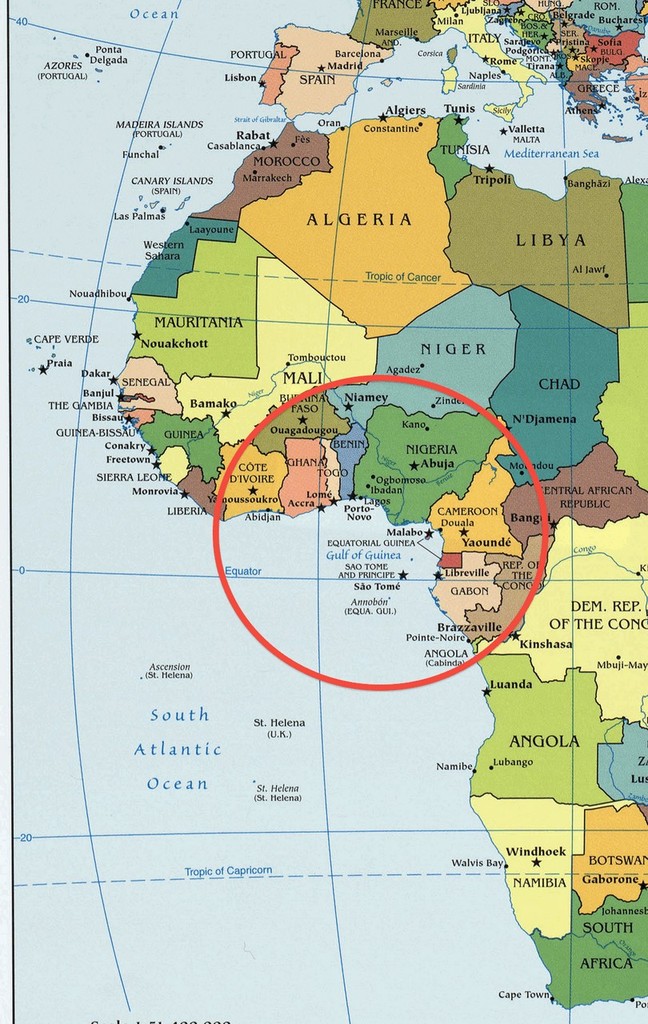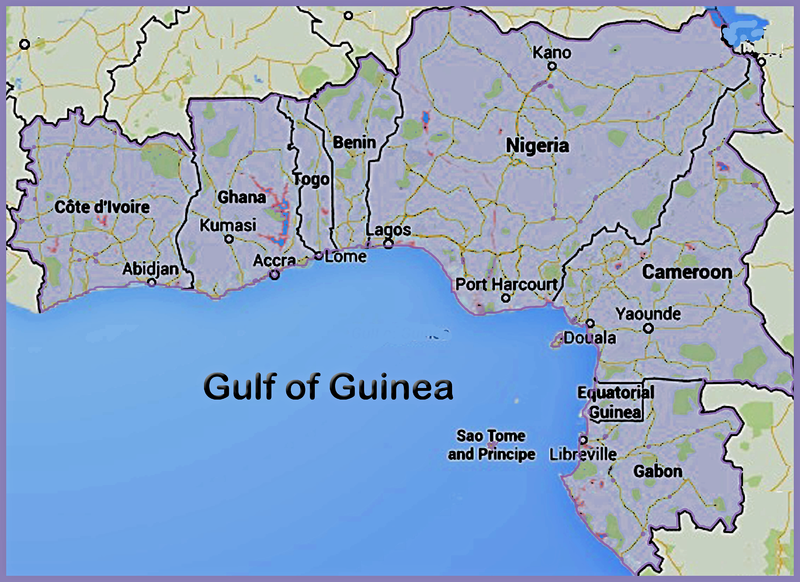The GoG Declaration or to give it its full form ‘The Gulf of Guinea Declaration on Suppression of Piracy’ was signed recently by 246 organisations connected with the shipping industry. These included shipping companies, charterers, Tanker operators, P & I clubs, Shipping Registries,etc. Incidentally the Indian Register of Shipping & the Great Eastern Shipping Company from India are signatories to this declaration. It would be in the fitness of things if we understand what was the background which led to the signing of this declaration and what does it seek to achieve.
What or where is the Gulf of Guinea?


As can be seen, The Gulf of Guinea lies on the west coast of Africa, an extension of the Atlantic Ocean.The important countries forming its basin include Nigeria, Ghana, Togo, Liberia,, Cameroon, Gabon, Cote d’Ivoire, etc. There are many islands in the gulf too, the major one being Sao Tome & Precipe. Geographically, The Prime Meridian ( Zero degrees longitude) & The Equator ( Zero degrees latitude) meet in the Gulf of Guinea.
Piracy reared its ugly head in the Gulf of Guinea around 2009. A combination of factors are cited as reasons for this — Large-scale unemployment/poverty among the youth in many of the surrounding countries, weak maritime security, conflicting or contrasting laws in the surrounding countries, corruption, and above all the movements of large oil tankers especially from Nigeria. So, is this close to Somalia and is there any link between the pirates here and the Somali pirates? Not at all. Somalia is on the Horn of Africa in the north and the Somali pirates operated around the Gulf of Aden and parts of the Indian Ocean. The modus operandi and the scale too are markedly differently.The Somali pirates seize vessels along with cargo and crew and demand huge ransoms. Once the ransom is paid, the vessel with the cargo and crew are released, largely unharmed. The methods of the Gulf Of Guinea pirates are different. They started off by seizing tankers , forcing the crew to take them to different locations where the oil was transferred to other vessels and sold off. Gradually they moved to stealing other types of cargo and valuables on board too. Then came the small demands for ransom for release of the vessels and crew in some cases. However,these pirates in the Gulf of Guinea are extremely violent and brutal. Killing of crew in ships has become common thereby heightening the problem — Human lives being more valuable any day than the cargo and vessels.
Another aspect of this problem is that, strictly on the basis of law, these violent acts of stealing and killing do not fall under the definition of ‘Piracy’. Article 101 of the United Nations Convention on The Laws of the Sea reads as below:
Piracy consists of any of the following acts –
a) Any illegal acts of violence or detention or any act of depredation committed for private ends by the crew or the passengers of a private ship or private aircraft and directed (i) on the HIGH SEAS against another ship or aircraft or against persons or property on board such ship or aircraft (ii) against a ship, aircraft, persons or property in a place outside the jurisdiction of any State.
b) Any act of voluntary participation in the operation of a ship or of an aircraft with knowledge of facts making it a pirate ship or aircraft.
c) Any act of inciting or of intentionally facilitating an act described in sub-paragraphs (a) and (b).
What happens in the Gulf of Guinea is termed EDR or Extended Duration Robbery. The vessel, seized along with the crew remains in the custody of the ‘pirates’ as they steal the cargo over a period of days/weeks. At the end, the crew and vessel may be released or the crew members killed. In March 2021, MT Davide B was attacked by pirates and the 15-member crew abducted. A month later, the crew was released unharmed. What transpired behind the scenes will never be known but kidnapping of crew alone for ransom now appears to have picked up. Around May 19th, 2021, i.e. less than a week back, a Ghanaian vessel MV Atlantic Princess was attacked by Nigerian pirates and the 5-member crew kidnapped. It may be noted that almost all these acts of kidnapping or EDR do not happen in the High Seas but within the territorial waters of one country or the other. In fact, when cargo is stolen under EDR, the disposal happens simultaneously on land too across countries. So in the narrowest legal sense, they do not fall under ‘Piracy’. Criminal gangs from different countries are involved in these activities.
The ICC International Maritime Bureau in its report states that the Gulf of Guinea has become extremely dangerous for seamen and attributed 43% of all piracy-related incidents in 2021 to this region. After considering the kidnapping of the Atlantic Princess crew, Dryad reports that the total number of seamen kidnapped in 2021 so far is 56. Although there is a thin presence of the French and US Navy in the area, it is insufficient to deter these criminals. Cohesive naval action by all the surrounding countries is required but the biggest handicap is resources. The International Maritime Organisation (IMO) in its resolution has called upon all members states, the United Nations and other organisations to strengthen law enforcement for capture and punishing of these ‘pirates’ and also make available improved protection solutions. Nigeria has started a program called Deep Blue which aims at providing coastal and inland waterways security by close co-ordination between the Ministries of Defense, Maritime Safety Agency, Police and the Army. Deep Blue has received international support in the form of resources for defense and communications.
So what does the Gulf of Guinea Declaration spell out? At the outset, it sets out 5 reasons why the current state of affairs is not acceptable — 1) The human toll is unacceptably high 2) The attacks are preventable 3) All stakeholders pay increased costs due to this piracy 4) Continued reliance on local security services will not eliminate this problem. 5) Poor security situation affects the economic growth of the region.
While making out the Problem Statement, the Declaration also spells out broad areas where work is to be done like Anti-piracy Law enforcement, Capacity building for local forces coupled with involvement of non-regional Navies and defense measures on board the ships passing through this region. The Declaration also sets out clear milestones with timelines. The two important expectations set out to be achieved are:
1) By the end of 2023, the number of attacks by pirates should be reduced from current levels by at least 80%
2) No seafarer should have been kidnapped from a ship in the preceding 12 months. This would mean NIL kidnappings in 2023.
Laudable objectives indeed! Hope all the stakeholders come together, quickly pool their expertise and resources to free this region from these criminal gangs. The battle will have to be fought on sea, air and land too. It will involve use of force and use of legal provisions too. There is no place for criminality, by whatever name called.
Discover more from BalasBroadcast
Subscribe to get the latest posts sent to your email.